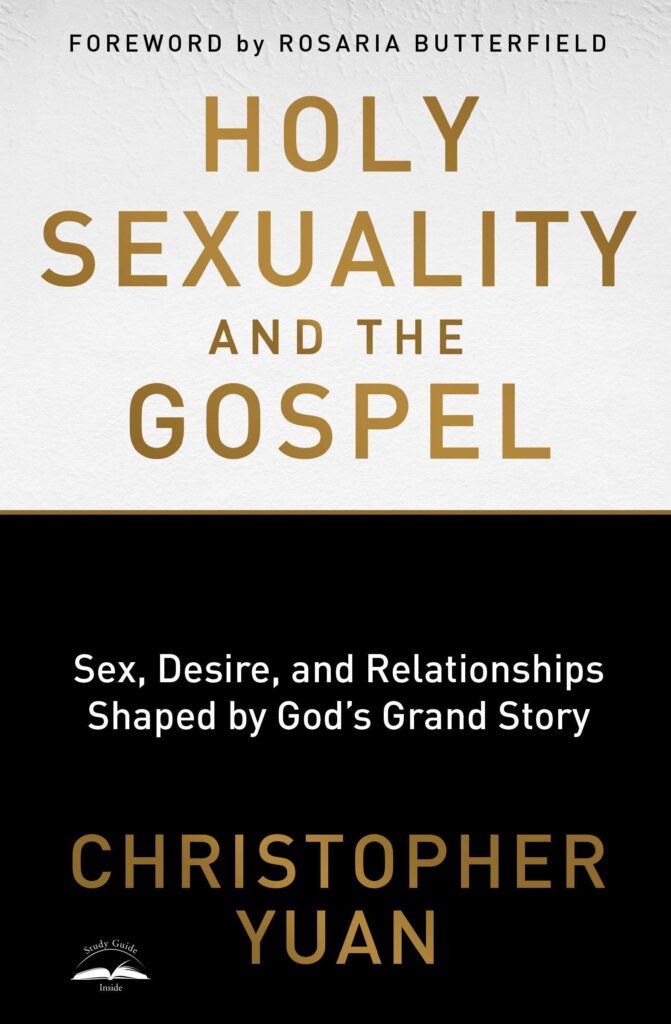
A little over a year ago, I was at a conference and Christopher Yuan spoke. He shared his story of turning to a homosexual lifestyle and some other bad decisions. These other decisions landed him in jail. It was during this time that God used Christians and his parents to call him to repentance and new life in Christ. Since then, Yuan has become a theology professor specializing in the doctrine of human sexuality. After hearing him speak, I immediately went and bought his book. I would very much recommend this book for any parent wanting to understand Christian sexuality, especially in articulating well our Christian beliefs to a culture that rejects our theology. I would also say, this should be on a must read list for every student pastor. This book should be at the top of the list for any collegiate pastor or church that desires a strong campus ministry! Below is a link to his book if you would like to read it as well.
In essence, Yuan believed the crisis of sexuality in our culture is better framed as a crisis of identity (8). Our culture has deeply linked our sexuality to our personhood. In a previous time, homosexuality was an action not a state of personhood. This is still the case in adultery, because no one identifies themselves as adulterers. An adulterer is someone who has committed adultery against his/her spouse. However, they do not say that they are born an adulterer. However, the new rhetoric for the LGBTQ+ community is they were born this way. This affirms the belief that sexuality is the ultimate fulfillment to a person’s identity and self-realization.
If this is true, then it would be utterly cruel of Christians to attempt to force a person who was unfortunately born with the wrong gender to stay that way. They would be living outside of their identity and never experience fulfillment.
According to Yuan, this crisis of personhood has even affected the heterosexuals (67). Heterosexuals now identify, if not verbally but practically, according to their sexual identity, hence the sexual revolution and the rise of sexual promiscuity. People are only living out their own identities that they too might experience fulfillment. This comes from an anthropology put forth by secular humanism that people are born inherently good but become corrupted. The Christian anthropology suggests that humanity was indeed created by God in a good and perfect state, bearing his eternal image. However, the fall is what led to original sin in each person, and each person is now born into a corrupted state. Therefore, a Christian must look to before the corruption of humanity for the accurate representation of what is good.
Yuan asserted that since humanity was made perfect and very good, then gender is part of that goodness (21). More importantly, because of this truth, Christians can let go of an improper misdiagnosis of homosexuality – namely environment and conditioning and not sin (34-35). There is perhaps no other sin that is placed so squarely on the parents than this one. A father may be told he was too harsh with his son, and now his son seeks male affection from somewhere else. This reasoning rejects the personhood God placed in humanity. Therefore, a person’s choice or proclivity towards homosexuality is not gauged towards the parents actions but towards the sin nature in that person that has corrupted them. Most importantly, then a person’s environment is to blame and the sacrifice of Christ is no longer necessary to redeem that person from sin. As Yuan stated it, “Yet if our environment causes us to sin, then there’s no need for Jesus – all wee need is a better environment. We’re not quibbling about different opinions here; the sufficiency of Christ is on the line, which is no insignificant matter.” (36).
Therefore, Yuan presented what he termed “holy sexuality: chastity in singleness and faithfulness in marriage.” (48). This definition is intended for people to live the life God has set for them in a holy way according to the gender that God assigned them. This is possible for both the single and the unmarried, and there are many biblical examples of both. Singleness is not a choice, because everyone is born single. Marriage is a choice, because that is a choice to enter into a covenant relationship with another person until death parts them.
In chapters 10-14, Yuan wrote to establish what holy singleness and holy marriage should look like. He evens gives great thought to how Christians can involved singleness in their churches since the New Testament affirms singleness as a gift for the sake of the gospel. Rather than having a culture of condemning the single for not marrying, the church should seek to aid the singles be effective in gospel work in and the through the church just as the church does this for married people. Lastly in this portion, he suggested the ramifications for the church acting more as a spiritual family and less as a secular organization.
In chapters 15-20, Yuan gave many helpful and pragmatic helps for Christians wanting to reach homosexuals with the gospel and how churches can integrate those individuals into its family. There are special considerations to creating a culture that is inviting to these new brothers and sisters in faith along with discipleship strategies to remove the shame of a past that was redeemed by Christ.
As a final resource, Yuan gave wrote an 8 week discussion guide to go with his book for a small group in a local church. I would highly recommend this discussion guide for local churches seeking to disciple their members in the doctrine of human sexuality and to better engage the LGBTQ+ community with the gospel.
I am still processing much of this book and the arguments presented, but again I would highly recommend this though provoking book to those in search of truth in regards to christian sexuality.
